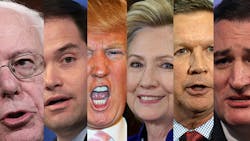WASHINGTON, D.C. — The United States has long been a leader of the free-trade movement around the world, and President Barack Obama set major trade treaties at the center of his economic initiatives.
That makes it all the more odd that free trade has become a certified villain among candidates battling to succeed Obama in the White House — and while it is not uncommon for Democrats to criticize free trade, the candidates of the Republican Party, long a defender of free trade, are falling over each other to demonstrate who is more protectionist.
That has raised questions over whether the next occupant of the White House will pursue ratification of one of Obama’s signal achievements, the Trans-Pacific Partnership trade deal (TPP), and complete negotiations on another, the Transatlantic Trade and Investment Partnership (TTIP).
On the Democratic front, Hillary Clinton, who supported the TPP talks as Obama’s secretary of state, now tells voters she does not like the pact.
“I don’t believe it’s going to meet the high bar I have set,” she said. “We’ve learned a lot about trade agreements in the past years, sometimes they look great on paper,” she said, pointing to the 2012 bilateral trade treaty with South Korea. “Looking back on it, it doesn’t have the results we thought it would have.”
Bernie Sanders, who is trailing Clinton, is firmer in his opposition. He said the TPP would be “disastrous” for American workers and serves only corporate needs in a “race to the bottom.”
Republicans Equally Critical
Among Republicans, the tone is hardly different.
Donald Trump, the real estate tycoon leading the pack, said the TPP “is going to lead to nothing but trouble” and has declared he would hit Mexico, China and Japan with high tariffs.
“Let’s slap a 45% tariff on Chinese imports,” Trump declared in January.
In a debate Thursday night, Trump’s main rival, Senator Ted Cruz, declared: “I opposed TPP, and have always opposed TPP. ... We’re getting killed in international trade right now.”
Such rhetoric has made U.S. business, which has strongly backed both of Obama’s pacts, nervous.
“We are concerned the prescriptions that have been offered are even worse than the disease,” said John Murphy, senior vice president for international policy at the US Chamber of Commerce. “Trade has been a huge part of the recovery.”
The new tone is deeply at odds with the country’s history of championing open borders and low tariffs. In 1994, Democratic president Bill Clinton completed the controversial North American Free Trade Agreement that lowered barriers on trade with Canada and Mexico.
In his wake, Republican president George W. Bush pushed ahead with a number of bilateral and regional trade pacts.
Obama’s TPP and TTIP pacts are far more ambitious, extending well beyond trade in goods to setting standards for investment and technology. He called them “agreements for fair and free trade that level the playing field for our workers, open new markets for our businesses.”
“These kinds of agreements reflect the realities of a 21st-century economy,” he said last year.
Angry Voters
But American voters do not appear persuaded, and the White House candidates understand that.
“What we are seeing is the consequences of trade policies that for years have never focused on helping Americans adjust to rising global economic competition,” said Edward Alden, a trade expert at the Council on Foreign Relations.
Critics point to the downturn in U.S. industry over the past two decades. Since 1994, the number of workers in manufacturing has dropped by 30%.
“There were a lot of people left behind by the globalization,” Alden said, “and they’re showing in this election that they’re upset about it.”
The secretiveness of TPP and TTIP negotiations has also stoked opposition.
“The time when you just negotiated and came to an agreement and people said, ‘Hmmm, that’s fine’ – those times are gone,” said the European Union’s chief trade negotiator Cecilia Malmstroem on a visit to Washington. “People want to be involved, they want transparency.”
If the change in tone persists after Obama’s successor moves into the White House in January 2017, it could make it much harder for the Europeans to strike a TTIP deal with Washington. But the Chamber’s Murphy said that the reality of the need to support ever-liberalizing trade rules will quickly come to the next president, as it did Obama.
“We’ve been there before. There’s a long tradition in American politics that the new occupant of the Oval Office often finds that trade is a tool needed for economic prosperity and national interests.”
By Jeremy Tordjman
Copyright Agence France-Presse, 2016
About the Author
Agence France-Presse
Copyright Agence France-Presse, 2002-2025. AFP text, photos, graphics and logos shall not be reproduced, published, broadcast, rewritten for broadcast or publication or redistributed directly or indirectly in any medium. AFP shall not be held liable for any delays, inaccuracies, errors or omissions in any AFP content, or for any actions taken in consequence.
